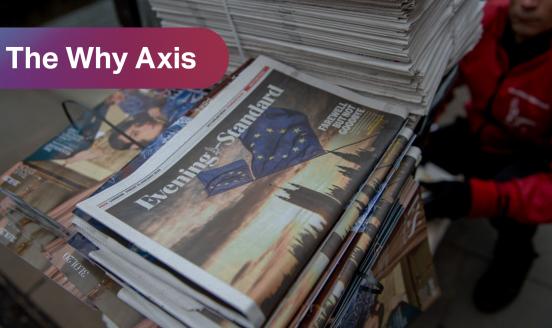Crony Capitalism In America?
Nicolas Véron comments Simon Johnson's widely-read piece in the Atlantic in which he compares the US situation with many emerging countries' "crony capitalism". While he essentially agrees with Johnson's assessment, he also brings some qualifications.
Simon Johnson is right in his core diagnosis. Regulatory capture has been all too ignored as an enabler of the crisis. Shifting the public conversation towards it, as Johnson does, is an important and welcome contribution. However, as he recognizes, "everyone has elites", and a purely anti-oligarchic agenda is unlikely to be of much help in solving the current mess.
Of course, very little of this is new. Machiavelli masterfully captured the oligarchy question's complexity when writing: "I maintain that those who blame the quarrels of the Senate and the people of Rome condemn that which was the very origin of liberty, and that they were probably more impressed by the cries and noise which these disturbances occasioned in the public places, than by the good effect which they produced; and that they do not consider that in every republic there are two parties, that of the nobles (i grandi) and that of the people; and all the laws that are favorable to liberty result from the opposition of these parties to each other, as may easily be seen from the events that occurred in Rome." (Discourses on Livy, First Book, Chapter 4, translation by Christian Detmold) To expand on Johnson's story, three remarks are worth mentioning.
1. The U.S. has not one moneyed oligarchy, but several. Specifically during most of the presidency of George W. Bush, the financial community has been far from dominant in national political power structures. It has been noted that during the years in which President Bush pushed a radical policy agenda, and until well after the Katrina turning point in his popularity, financiers had been rather underrepresented in the administration, certainly when compared with the Clinton era. This situation was symbolized by the successive tenures of Paul O'Neill and John Snow, two non-financial business figures, at the head of the U.S. Treasury. This obviously changed in the spring of 2006 when Joshua Bolten replaced Andrew Card as presidential chief of staff, and other Goldman Sachs alumni including Paulson were appointed to a number of key positions. But the dominant oligarchy during most of the Bush years was made of non-financial CEOs and company owners, not Wall Street types.
2. The U.S. financial oligarchy is surprisingly meritocratic. This is attested by the modest social origins of most latter-days Wall Street titans: think of Sandy Weill, Chuck Prince, John Mack, Dick Grasso, Stan O'Neal, or Lloyd Blankfein. This echoes some other crony capitalism contexts - Russia comes to mind - but differs from others, such as many cases in Latin America, and is unusual in a country with as much recent political stability as America.
3. Even as Johnson argues that the US has "the world's most advanced oligarchy", it is arguably not the most entrenched, even among developed economies. America has so far been more willing to clamp down on its financial oligarchy than many European countries, and by some measures the gap is increasing as we advance through the crisis. In France, large financial firms exert dominant influence on the government's stance on financial reform. In Germany, both the finance minister and his state secretary for financial affairs have been involved in the governance of now-failed banks, respectively WestLB and IKB. In the UK, the current prime minister spent many years at the Treasury courting the favors of the financial industry. The European Commission has a track record of being generally less captured than individual member states (as analyzed in Adam Posen's insightful piece) but Charlie McCreevy's tenure as Commissioner in charge of financial services has lowered its moral ground.
4. Since the November elections, there is continued evidence that the U.S. Congress is at least partly captured by the financial oligarchy, such as the pressure it recently exerted on the Financial Accounting Standards Board to bend accounting standards and allow banks to further hide the bad news. But the jury is still out as regards the executive branch, and so far there are arguments to give the Obama team the benefit of the doubt. Specifically, the primary reason why the U.S. has not treated its banking sector as Sweden successfully did in 1992 is arguably not the Treasury's capture by the industry, but rather the lack of broad domestic political consensus, an indispensable condition to take a step as radical as nationalizing a significant number of banks. The key role played by bipartisan consensus in the Swedish crisis is well illustrated by Governor Bäckström's speech at Jackson Hole in 1997.
All this does not modify Johnson's harsh verdict, it only puts it into perspective. As to the policy prescriptions, I agree with the need to nationalize insolvent banks à la Sweden 1992, but am less sure that reducing the oligarchy's power should be an aim in itself; in any case it will not be sufficient. This makes me somewhat skeptical of the proposal to practically put a cap on the size of financial service firms. In other words, I fail to be convinced that the U.S. needs to arbitrarily detain its Mikhail Khodorkovskys or break up its Yukoses. What is needed instead is to upgrade the authority and capability of public institutions (mantenere lo stato, as Machiavelli put it) so that they can keep the oligarchs in check. And as our oligarchy has been going global in the past few years, this is not only a U.S. task, but increasingly a supranational one as well.



